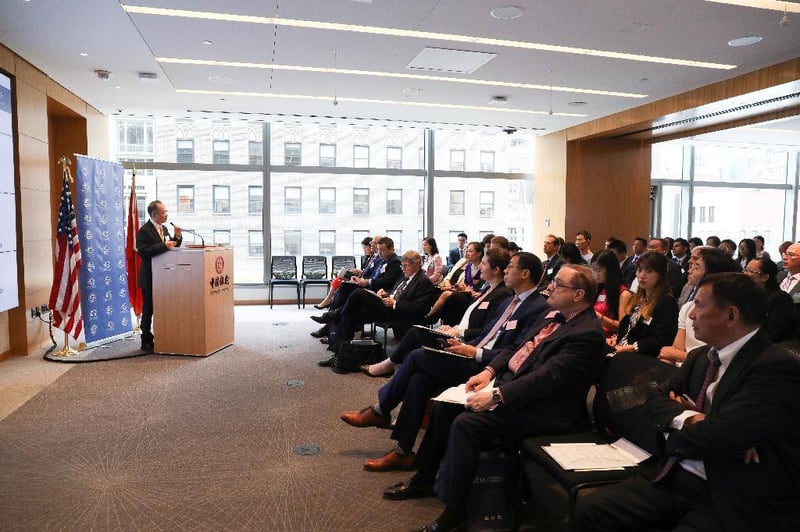
On June 27th, 2018, CGCC co-hosted “Is International Arbitration in China Impartial: The Perspectives of the Shenzhen Court of International Arbitration (SCIA) and its Reform and Innovation”, a seminar which took place at the Bank of China Building in New York with member companies Zhong Lun Law Firm and DeHeng Law Firm as well as SCIA, New York International Arbitration Center, North American Representative Office of Shenzhen, China. The seminar convened representatives from the business and legal communities of China and the US to discuss risk control and resolution in regards to the cross-border business dispute. Leading stakeholders engaged in a lively dialogue on China and the SCIA’s recent innovations, which are designed to enhance the independence and impartiality of international arbitration, mediation, and negotiation facilitation. A total of 121 representatives from the US legal and business communities, as well as representatives from Chinese businesses operating in the US attended the seminar.

The first keynote speech was delivered by Dr. Xiaochun Liu, the President of SCIA. He outlined the unique characteristics and innovations of SCIA. In responding to concerns about whether or not Chinese arbitration was independent, Dr. Liu described how the Council of the SCIA, by regulation, must have at least one third of its members come from foreign countries. “This is a very unique and special co-governance structure in China, by this way we can enhance the independence of the arbitration body”. Dr. Liu shared some insights into how the SCIA was able to use arbitration and mediation to efficiently settle cross-border business disputes between US and Chinese parties. He explained that SCIA’s success was due to the independence and neutrality of their arbitration process.

Prof. William W. Park, Professor of Law at Boston University, delivered the second keynote speech, where he discussed how to balance time, efficiency, cost, and impartiality in arbitration. By drawing on his vast experience in the international arbitration field, Prof. Park discussed specific cases in which these goals were in conflict. He emphasized that in international arbitration, one must pay attention to the difference between cultural backgrounds and varying international legislation.

After these insightful addresses, the speakers joined a group of experts to discuss the development trend of international arbitration rules, and in particular, China-related Arbitration. The panelists were Dr. Liu, Prof. Park, Ranse Howell, Director of International Operations at JAMS, Christian Alberti, Assistant Vice President of ICDR, Lisa M. Richman, Partner at McDermott Will & Emery LLP, Maoyuan Zhu, Partner at Zhong Lun Law Firm (Beijing), and James Shorter, Senior Counsel at DeHeng Law Firm, and was moderated by Mark Feldman, Professor of Law at Peking University’s School of Transnational Law. Each panelist gave brief remarks before discussing the themes of the keynote speeches and fielding questions from the audience. Some of the panel’s discussions focused on how to ensure the efficiency and impartiality of international arbitration, how to improve the professionalism of arbitrators, and how to establish a better legal environment.

Prof. Sibao Shen, the Chairman of the Council of SCIA, provided closing remarks in which he explained how the value that traditional Chinese culture places on harmony and win-win relationships is reflected in arbitration with Chinese characteristics. He also announced how China will take two new measures to intensify internationalization in arbitration: the Supreme People’s Court will establish two international commercial courts in Shenzhen and Xi’an, and the SCIA will be involved with organizing a new institute focusing on the prevention and resolution of disputes in China. Prof. Shen finished by praising the seminar for facilitating dialogue between the US and China on arbitration and culture as well as promoting international business relationships.
CGCC thanks all of the co-hosts, guests, experts, and business representatives for organizing and attending the seminar. We hope that this seminar can further generate more conversation, facilitate the development of international arbitration institutions, and improve the mutual understanding between the US and China in law and culture.